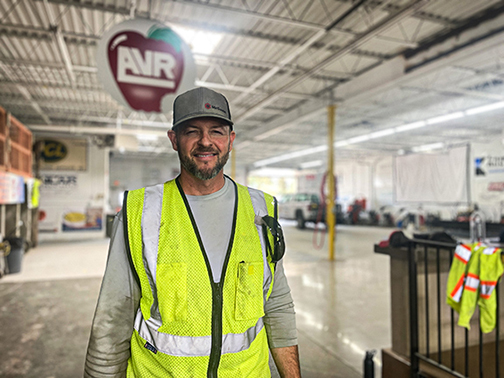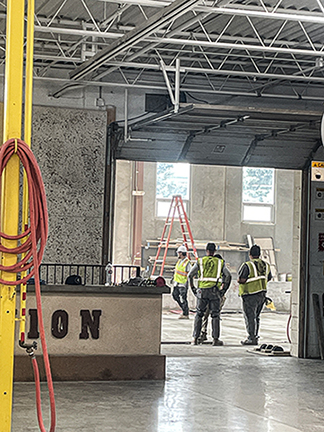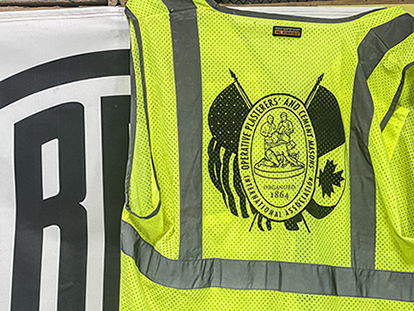MTA Interns Get Hands-on Experience at the Cement Masons Local 633
Interns learn how theory meets practice, right on site at the Cement Masons Local 633 JATC.
New Brighton, Minnesota – It’s 9:30 am and the workday has just begun for Minnesota Trades Academy (MTA) interns. Arriving on-site at the Cement Masons Local 633, interns prepare for a day of touring the cement masons’ facility and accomplishing two main tasks: learning the theory involved in a career as a cement mason and then applying that theory to the job.
The Minnesota Trades Academy is a program funded and conducted by the Construction Careers Foundation, a nonprofit organization whose mission is to “increase the diversity of entrants into the construction trades and foster long-term construction careers.” MTA is a summer internship program that supports this mission by offering paid summer construction internship experiences for selected high school youth. The goal of the program is to help youth prepare for adulthood through skill development, personal development, and knowledge on how to access good jobs with good benefits in the construction industry.

Photo: Brian Farmer, Apprenticeship Coordinator for Cement Masons Local 633.
Brian Farmer, Apprenticeship Coordinator for Local 633, began the day by getting the interns up to speed and introducing them to the trade. Then, he got the interns pouring concrete as soon as possible. With almost 7 years under his belt working with MTA interns, Farmer notes the importance of hands-on, applied learning and creating respectful work environments that help get them ready for a future in the trades.
“I think the interns are amazing. From the second they come in, I can see they’re excited, but they still question – Am I going to enjoy this or not? So, we say, you guys are about to experience a day in the life of a cement mason. I try to schedule concrete to be here right when they arrive. They showed up at 9:30 today, so I had concrete at 10,” said Farmer. “Once concrete shows up, they go through the whole progression of a pour, to placement, to finish. They get to see the whole picture. Physically getting into the concrete, not knowing anything, and progressively just doing it the whole time is perfect.”
Everything is about exposure. Training centers like Local 633 offer MTA interns the opportunity to engage with a specific trade and learn about what goes into a career within that trade. An intern may take the day as an introduction to a new skillset, or it can spark a real interest in a career as a cement mason.

Photo: Brian Farmer and others hard at work at the Cement Masons Local 633 Training Center.
Before the interns started to pour the cement, Farmer began the day with stretching and bucket drills. The interns carried buckets filled with class 5 cement across the space, giving them a taste of what kind of physical exertion the job requires and warming them up for the job to come. If that’s too easy for them, Farmer gives them a handful of cinder blocks to carry back and forth too.
“We make it a race. We try to physically engage them first before we throw them right in the mix as far as the concrete goes – just something fun that we do. But also, if we don’t do something like that, we’re kind of shortchanging them or creating a false hope. It’s very physically demanding what we do. Concrete’s essentially our boss,” said Farmer.
Transparency is important when it comes to relaying expectations within a trade. Farmer makes sure to emphasize opportunities that various careers in the construction trades provide, such as an attractive wage, healthcare, a pension, and learning and taking pride in a highly lucrative skill set.
Where Theory Meets Practice
Before the work began at the Cement Masons Local 633, MTA interns are treated to a basic introduction to the trade by applying the technical information briefly lectured to them in the classroom. Farmer teaches them about the tools of the industry – how to use them, the mechanics, and the ergonomics. He also introduces them to concrete composition and the several different kinds of mixes cement masons use. It’s not expected that the interns grasp everything they have to show, so long as they begin to understand what the job entails.
“I tell the interns that the key to success is to be reliable and dependable. There is no prerequisite for anything as far as how much you have to know to get into a trade,” said Farmer. “Can you show up and be reliable, dependable, and teachable every day? And, as a bonus, come with a good attitude – that’s all it takes to be successful.”

Farmer got his start in the industry in high school, picking up concrete jobs during the summers in his hometown of South Peoria, Illinois. He’s worked on many significant projects since then, including locations such as Macalester University, Hamline University, Carleton College, and the Ordway.
Over the years, Farmer has gained insight on the changing industry, taking note of different work environments and finding balance in his personal and professional life. With more jobs available, more diversity, and more opportunities, young and aspiring workers have the ability to try things out and get the experience they need before choosing a path to follow. With people like Farmer, who are willing and able to show what a real experience is like in the trades, interns foster an honest understanding of what can be expected of them as young professionals.
It’s important to not only expose these interns to the trades, but also to provide schools, teachers, and students with exposure to what a career in construction really looks like. Construction careers are essential, and require expertise in skills such as math, hands-on labor, and the ability to perform hard work.
For educators who seek to increase their students’ awareness of a career in the construction trades, Farmer says Local 633 is always open for school tours and invites students and staff to come in and learn about the trade.
“The MTA program is so important. We’ve got to continue this,” said Farmer. “It’s my job to create that learning environment so the interns can thrive because the exposure for these kids is priceless.”
Construction Careers Foundation: Learn on the Job
For more resources catered to educators, students, and counselors, visit www.ConstructionCareers.org.
To read more stories similar to this one, visit the Construction Careers Foundation Success Stories page.
